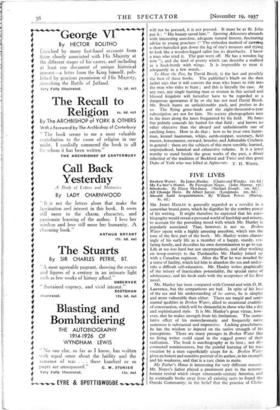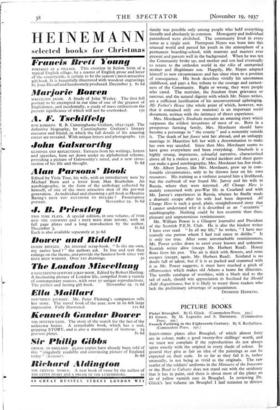FIVE LIVES
8s. 6d.)
MR. JAMES HANLEY is generally regarded as a novelist in a somewhat brutal genre, which he dignifies by the sombre pow.sr of his writing. It might therefore be expected that his auto- biography would reveal a personal world of hardship and misery, to account for the prevailing mood with which Mr. Hanley is popularly associated. That, however, is not so. Broken Water opens with a highly amusing anecdcite, which sets the tone of the first part of the book. Mr. Hanley writes charm- ingly of his early life as a member of a happy, sturdy, s za- faring family, and describes his own determination to go to sea. Life at sea was hard but not unsympathetic, and after working on troop-convoys to the Dardanelles Mr. Hanley joined up with a Canadian regiment. After the War he was invaded by a sense of futility, which led him to abandon the sea and under- take a difficult self-education. Mr. Hanley writes graphically of the misery of inarticulate potentiality, the special curse of adolescence, and his book ends with the acceptance of his first novel.
Mr. Hanley has been compared with Conrad and with D. H. Lawrence, but the comparisons are bad. In spite of his love of the sea and his understanding of les autres, he is simpler and more vulnerable than either. There are turgid and senti- mental qualities in Broken Water, allied to occasional crudities of construction, which will be distasteful to those who like a dry and sophisticated style. It is Mr. Hanley's great virtue, how- ever, that he makes strength from his limitations. The cumu- lative effect of his monochromatic and frequently naïve sentences is substantial and impressive. Lacking gracefulness, he has the wisdom to depend on the native strength of his perceptions. There are many passages in Broken Water that no living writer could equal in the rugged power of their realisation. The book is autobiography at its best ; not dip- connected reminiscences, but the painful learning of his true vocation by a man superficially unapt for it. Broken Water gives an honest and sensitive portrait of its author, in his strength and his weakness, and that is a rare claim to make.
My Father's House is interesting for very different reasons. Mr. Noyes's father played a prominent part in the noncon- formist revival which swept nineteenth-century America, and he eventually broke away from all existing sects to found the Oneida Community, in the belief that the practice of Chris-
tianity was possible only among people %Oho held" everything literally and absolutely in common. Monogamy and individual parenthood were abolished. The community lived in every sense as a. single unit. Pierrepont Noyes was born into this unusual world and passed his youth in the atmosphere of a permanent boarding-school, with matrons and masters ever present and parents well in the background. When he was ten the Community broke up, and mother and son had eventually
to return to the orthodox world in the roles of .unmarried mother and illegitimate son. Happily, Mr. Noyes adapted himself to new circumstances and has since risen to a position of consequence. His book describes vividly his uncommon childhood, and pays a fine tribute to the courage and earnest- ness of the Community. Right or wrong, they were people who cared. The restraint, the freedom from grievance or rancour, and the natural dignity with which Mr. Noyes writes, are a sufficient justification of his unconventional upbringing. My Father's House (the whole point of which, however, was that it contained only one mansion) is an important social document, written with the intimacy of direct experience.
Mrs. Mordaunt's Sinabada recounts an amazing story which surpasses the wildest inventions of most of us. Born in a prosperous farming family, Mrs. Mordaunt should have become a personage in " the county " and a nonentity outside it. The death of her:flan-a sent her abroad, and an unhappy marriage in Mauritius left her with a determination to make her own way unaided. Since then Mrs. Mordaunt seems to have gone everywhere and been everything. Sinabada is a highly strung, impetuous, colourful narrative, characterised above all by a tireless zest ; if varied incident and sheer gusto can make a good autobiography, Mrs. Mordaunt has few rivals.
Mr. Albert Jarosy, like Mrs. Mordaunt, grew up in com- fortable circumstances, only to be thrown later on his own resources. His training as a violinist assured him a livelihood, but the outbreak of war found Mr. Jarosy and his wife in Russia, where they were interned. All Change Here is mainly concerned with pre-War life in Courland and with Mr. Jarosy's experiences in Russia, whence he finally made a dramatic escape after his wife had been deported. All Change Here is such a good, plain, straightforward story that I cannot understand why it is described as an " eccentric " autobiography. Nothing could be less eccentric than these pleasant and unpretentious reminiscences.
Mr. William Power is a Glasgow journalist and President of the Scottish P.E.N. Club. He is also the kindest writer I have ever read. " In all my life," he writes, " I have met scarcely one person whom I had real cause to dislike." It is only too true. After some imreniarkable reminiscences, Mr. Power settles down to extol every known and unknown Scottish writer alive (except Mr. Herbert Read). Honey flows from his pen. The air is thick with flowers, and none escapes (except, again, Mr. Herbert Read). Scotland is no doubt full of talent, but if it is as packed and crammed with it as Mr. Power suggests, it must have reached a pitch of efflorescence which makes old Athens a home for illiterates. The terrific catalogue of worthies, with a blurb tied to the tail of each, should win appreciation in Scotland for Should Auld Acquaintance, but it is likely to weary those readers who lack the preliminary advantage of acquaintance.
DESMOND HAWKINS.

















































































































 Previous page
Previous page